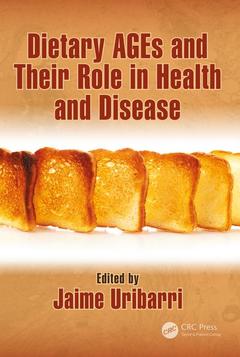Dietary AGEs and Their Role in Health and Disease
Coordonnateur : Uribarri Jaime

Of the many dietary factors associated with inflammation and oxidative stress, a specific group are food-derived pro-inflammatory and pro-oxidant compounds, so-called advanced glycation end products (AGEs). While AGEs have been recognized as factors in the pathogenesis of diabetic complications, the importance of AGEs of dietary origin as a factor in human disease is of more recent concern. This book presents data from the past two decades on the role of AGEs in causing chronic disease. It starts by defining the compounds passing through all the clinical diseases that have been associated with them and finishes by offering different therapeutic options to deal with the problem.
Chapter 1: What are AGEs, their chemical structure, and how can they be measured?
Chapter 2: How do AGEs cause disease: cellular mechanisms
Chapter 3: AGE clearance mechanisms
Chapter 4: How are AGEs handled by the kidney?
Chapter 5: Dietary advanced glycation end products: animal studies
Chapter 6: AGEs in infant formulas: chemical and physiological aspects
Chapter 7: Potentially toxic food components formed by excessive heat processing
Chapter 8: Is part of the fructose effects on health related to increased AGE formation?
Chapter 9: Role of advanced glycation products in health and disease in children
Chapter 10: The role of advanced glycation end products in cognitive decline and dementia
Chapter 11: Advanced Glycation End-Products (AGEs) and Polycystic Ovarian Syndrome (PCOS)
Chapter 12: Dietary AGEs and diabetic complications
Chapter 13: Dietary AGEs and aging
Chapter 14: AGE and Erectile Dysfunction: any role of dietary AGEs?
Chapter 15: Biological implications of diet-derived advanced glycation end-products on carcinogenesis
Chapter 16: Advanced glycation end products and their receptors in Aspiration Induced Acute Respiratory Distress Syndrome
Chapter 17: Dietary AGEs in the development and progression of chronic kidney disease
Chapter18: Dietary AGEs may have different effects in people with vegetarian versus omnivorous eating patterns
Chapter 19: Effects of dietary AGEs in the gut microbiota composition
Chapter 20: Associations of circulating AGE levels and cardiovascular disease- incidence and outcome
Chapter 21: Pathological role of AGEs in osteoporosis
Chapter 22: Is there a relationship between dietary AGEs and food allergies?
Chapter 23: Quantitation and potential health effects of advanced glycation end-products in pet foods
Chapter 24: The role of AGEs in the pathogenesis of macrovascular complications in diabetes mellitus
Chapter 25: Plant-derived products with anti-glycation activity
Chapter 26: Dietary intake of AGEs and ALEs and inflammation – nutritional aspects
Chapter 27: Effects of a low AGE diet on insulin sensitivity
Chapter 28: Clinical trials with an AGE-restricted diet
Chapter 29: Blocking gastrointestinal absorption of AGEs
Chapter 30: Antagonizing the effects of dietary advanced glycation endproducts on endothelial dysfunction
Chapter 31: Methylglyoxal and other AGEs: good and bad dual role in the body
Date de parution : 10-2017
17.8x25.4 cm
Disponible chez l'éditeur (délai d'approvisionnement : 13 jours).
Prix indicatif 329,31 €
Ajouter au panierThèmes de Dietary AGEs and Their Role in Health and Disease :
Mots-clés :
Low Age Diet; Dietary Age; Alejandro Gugliucci; High Age Diet; Alma Rosa Corrales Escobosa; Age Level; Amelia K; Fotheringham; Dietary AGEs; Anshu Gupta; Age Formation; Armando Gomez-Ojeda; Maillard Reaction; Armando G?Mez-Ojeda; Dietary Age Intake; Armando Rojas; Gut Microbiota; Aron M; Troen; Age Accumulation; Barbora De Courten; SIRT1; Carolina AAzco; CKD Patient; Claudia Luevano-Contreras; Serum AGEs; Cristina Delgado-Andrade; Aldose Reductase; David P; Turner; T1 Dm; Delminda Neves; Age BSA; Dipshikha Chakravortty; P66 Shc; Eleni A; Kandaraki; T2 Dm; Estifanos Baye; Serum Age Level; Evanthia Diamanti-Kandarakis; Polycystic Ovarian Disease; Franco Pedreschi; sRAGE Levels; Ghada Elmhiri; Guido Bosch; Endothelial Dysfunction; Halyna Semchyshyn; Nod Mouse; Ileana Gonzalez; Homeostatic Model Assessment; Jamie Uribarri; John C; He; Josephine M; Forbes; JosGel Rufi? Henares; Julie Ottosen; Kapudeep Karmakar; Kari Anne Sveen; Kasturi Chandra; Katarina Ebekov?; Katarzyna Wrobel; Katar Brouder Ebekov?; Kazimierz Wrobel; Kristian F; Hanssen; Latifa Abdennebi-Najar; Laura C; Cogoi; Linda A; Gallo; Ma; Eugenia Garay-Sevilla; Marisa Passarelli; Masako Toda; Mayuri Gogoi; Melinda M; Nugent; Melpomeni Peppa; Michael Murkovic; Michal Schnaider Beeri; Ovidiu Alin Stirban; Peter Smit; Rabi Yacoub; Roni Lotan; Rosana Filip; Sarahi Jaramillo Ortiz; Sergio PZ-Burillo; Sho-Ichi Yamagishi; Silvia Pastoriza; Stig Bengmark; Tasnim Rahman; Victoria J; Findlay; Weidun Alan Guo; Wouter Hendriks



